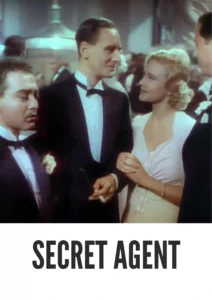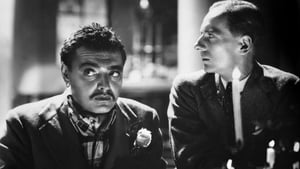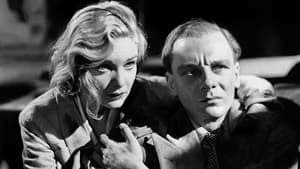Contact: [email protected]
Video Sources 0 Views
- Watch trailer
- Secret Agent


Synopsis
Table of Contents
ToggleReview: Secret Agent (1936) – A Gripping Spy Thriller Unveiling the Shadows of Espionage

Introduction
“Secret Agent” (1936) delves into the shadowy world of espionage, captivating audiences with its suspenseful plot and compelling characters. In this article, we’ll explore the significance of this classic spy thriller and its enduring legacy in the realm of cinema.
Check The Full Colorized Movies List
Check Our Colorized Movies Trailer Channel
Understanding Secret Agent 1936: Director, Cast, and Genre
Directed by the legendary Alfred Hitchcock, “Secret Agent” (1936) showcases his mastery of suspense and intrigue. The film features a talented cast, including John Gielgud, Madeleine Carroll, and Peter Lorre, whose performances bring the story to life with intensity and emotion. Blending elements of espionage, romance, and mystery, “Secret Agent” (1936) immerses viewers in a world of danger and deception, where nothing is as it seems.
Exploring the World of Secret Agent 1936: Plot and Characters
At its core, “Secret Agent” (1936) follows the exploits of a British intelligence agent, portrayed by John Gielgud, as he embarks on a perilous mission to track down a German spy during World War I. Along the way, he encounters a mysterious woman, played by Madeleine Carroll, whose loyalties are shrouded in secrecy. As the stakes escalate and tensions rise, the stage is set for a thrilling showdown that will test the limits of loyalty and trust.
The Art of Film Colorization
While “Secret Agent” (1936) was originally filmed in black and white, the decision to release it in a colorized format offers viewers a fresh perspective on Hitchcock’s masterful direction and the film’s atmospheric visuals. By adding color to key scenes and settings, colorization breathes new life into the story, enhancing its immersive qualities and inviting audiences to experience the world of espionage in vivid detail.
Early Colored Films: A Brief History
The history of colored films dates back to the early days of cinema, with filmmakers experimenting with various techniques to add color to their creations. From hand-painted frames to early Technicolor processes, the evolution of colored film has been marked by innovation and ingenuity, paving the way for the development of modern colorization techniques that continue to captivate audiences to this day.
Secret Agent 1936 and Its Early Colored Version
The decision to release “Secret Agent” (1936) in a colorized format was met with both excitement and skepticism. While some welcomed the opportunity to experience the film in vibrant color, others expressed concerns about the potential impact on its visual aesthetic. Nevertheless, the early colored version of “Secret Agent” (1936) offers viewers a fresh perspective on Hitchcock’s classic thriller, enhancing its visual appeal and immersing audiences in its world of intrigue and suspense.
The Debate Over Film Colorization
The debate over film colorization continues to divide audiences and critics alike, with proponents praising its ability to breathe new life into classic movies and introduce them to a new generation of viewers, while detractors argue that it compromises the artistic integrity of the original work and diminishes its historical significance. As the debate rages on, filmmakers and audiences alike are left to ponder the merits and drawbacks of colorization in the ever-evolving landscape of cinema.
Examining Secret Agent 1936 as an Early Colored Film
As with any colorized classic, the impact of colorization on “Secret Agent” (1936) is a matter of personal interpretation. Some may argue that it enhances the film’s visual appeal and immerses viewers in its world, while others may feel that it detracts from the stark beauty of the original black and white version. Regardless of one’s stance on the issue, there’s no denying the enduring power of “Secret Agent” (1936) as a gripping spy thriller that continues to captivate audiences with its suspenseful plot and memorable characters.
Influence and Legacy: Secret Agent 1936’s Impact on Cinema
“Secret Agent” (1936) has left an indelible mark on the world of cinema, inspiring countless filmmakers and captivating audiences with its thrilling story and masterful direction. From its tense espionage plot to its memorable performances, the film continues to resonate with viewers of all ages, reaffirming its status as a timeless classic of the spy thriller genre.
Director’s Cinematic Legacy: Beyond Secret Agent 1936
Alfred Hitchcock’s influence extends far beyond “Secret Agent” (1936), with a vast body of work that continues to captivate audiences around the globe. From “Psycho” to “Vertigo,” Hitchcock’s films are celebrated for their suspenseful plots, complex characters, and innovative storytelling techniques, solidifying his legacy as one of the greatest directors in cinematic history. Through his groundbreaking work, Hitchcock has left an indelible imprint on the world of cinema, inspiring generations of filmmakers to follow in his footsteps.
Themes Explored in Secret Agent 1936
“Secret Agent” (1936) explores a myriad of themes, from the nature of loyalty and betrayal to the moral ambiguity of espionage. Through its richly drawn characters and tense narrative, the film invites viewers to ponder the complexities of human nature and the consequences of our actions. As audiences immerse themselves in the world of “Secret Agent” (1936), they are reminded of the eternal struggle between good and evil and the fragile nature of trust in a world consumed by deception.
Reception and Controversy Surrounding Secret Agent 1936
Upon its release, “Secret Agent” (1936) received widespread critical acclaim, with many praising its taut suspense, atmospheric visuals, and memorable performances. However, the decision to release the film in a colorized format sparked debate among purists, reigniting the age-old discussion surrounding film preservation and artistic integrity. Despite the controversy, “Secret Agent” (1936) remains a beloved classic that continues to captivate audiences with its timeless story and masterful direction.
Where to Watch Secret Agent 1936 Online
For those eager to experience the gripping suspense of “Secret Agent” (1936), the film is readily available on popular streaming platforms such as Netflix, Amazon Prime, and Hulu. Whether you choose to watch it in its original black and white format or the early colored version, “Secret Agent” (1936) promises to transport you to a world of intrigue and espionage, where nothing is as it seems and danger lurks around every corner.
FAQs About Secret Agent 1936
Q: Is “Secret Agent” (1936) based on a true story? A: No, “Secret Agent” (1936) is a work of fiction crafted by Alfred Hitchcock, who drew inspiration from various espionage novels and real-life events to create a gripping thriller that continues to captivate audiences to this day.
Q: Who are the main actors in “Secret Agent” (1936)? A: “Secret Agent” (1936) features an ensemble cast led by the talented John Gielgud, Madeleine Carroll, and Peter Lorre, whose performances bring the characters to life with intensity and depth.
Q: What awards did “Secret Agent” (1936) win? A: While “Secret Agent” (1936) did not win any major awards, it received critical acclaim for its suspenseful plot, atmospheric visuals, and memorable performances.
Q: Why was “Secret Agent” (1936) released in a colorized format? A: The decision to release “Secret Agent” (1936) in color was made to introduce the film to a new generation of viewers and enhance its visual appeal for modern audiences. While the choice to colorize the film sparked debate among purists, it ultimately allowed “Secret Agent” (1936) to reach a wider audience and ensure its continued relevance in the annals of cinematic history.
Conclusion
“Secret Agent” (1936) remains a testament to Alfred Hitchcock’s genius as a filmmaker and storyteller, captivating audiences with its gripping plot, memorable characters, and atmospheric visuals. Whether viewed in its original black and white format or the early colored version, the film continues to enthrall viewers with its timeless tale of espionage and intrigue, reaffirming its status as a classic of the spy thriller genre. So, whether you’re a Hitchcock aficionado or a casual moviegoer, take a journey into the shadowy world of espionage with “Secret Agent” (1936) and experience the thrill of the chase as only Hitchcock can deliver.












